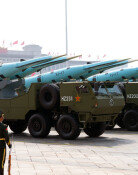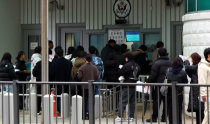Korean economy declines swiftly
The nation`s economy hit a peak of the current cycle during the first quarter and there are signs everywhere that it is now declining at an abrupt pace, according to the Korea Development Bank, a government think-tank.
KDI warned that if the economy is to cool off quickly, it would cause an economic trouble and make it difficult to carry forward restructuring, noting that the restructural reform has to be completed by the first half of next year at the latest.
It also noted that the current phase of economic recovery could be shortened and economic fluctuation would be greater, hampering a stable growth of the Korean economy, unless insolvency of corporations and financial institutions are removed promptly. The institute called for the government to raise additional public funds for settlement of non-performing assets of financial institutions.
The KDI report on economic prospects, which was announced on July 13, said that second-half`s economic growth would slow down substantially from the first half. Still, the economic growth in 2000 would reach 8.6% as projected earlier this year, it analyzed.
Also, this year`s current-account surplus may be sharply reduced to US$9.5 billion from 1999`s
US$25 billion due to soaring import prices of crude oil and other goods. It forecasted that the consumer price will remain stable with an annual increase of 2.1%.
In the latter half, however, there will be an inflationary pressure in line with wage hike as well as rise in utilities and other public charges, according to KDI.
The institute reported that the current economic situation remains healthy despite a slowdown in overall economic growth, urging that restructuring of corporations and finanical institutions has to be carried forward aggressively to recover a reliability in the market and build a firm basis for stable operation of macroeconomic sector before the economy start to decline substantially.
In particular, it pointed out that the government policy, which was so far focused on dealing with non-performing assets of financial institutions, is required to shift to the corporate sector, the fundamental source of insolvency.
"The current insolvency of local financial institutions is stemming from accumulated insolvency of corporations as a result of their investment failures over a long period," said Kim Joon-Il, KDI`s research fellow. "So, it is necessary to replace the management, who is responsible for the insolvency, and to take an aggressive measure to inject enough public fund into those corporations



![화장실 갇혔을 때 생존법…“최후에는 변기뚜껑” [알쓸톡]](https://dimg.donga.com/c/138/175/90/1/wps/NEWS/IMAGE/2025/12/26/133042007.3.png)
![[속보]李, 초대 기획예산처 장관에 ‘국힘 3선’ 이혜훈 파격 발탁](https://dimg.donga.com/c/138/175/90/1/wps/NEWS/IMAGE/2025/12/28/133048722.1.png)


